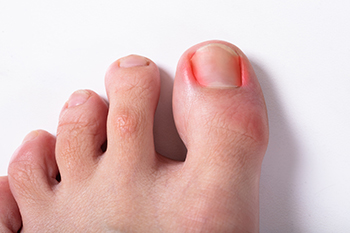(410) 764-7044
6506 Reisterstown Road, Baltimore
1205 York Road, Lutherville
6305 Belair Road, Baltimore
7809 Wise Avenue, Dundalk
Ingrown Toenails in Children
Tuesday, 04 July 2023 00:00
Ingrown toenails, or onychocryptosis, is a nail disorder that children and adults can get where the toenail grows into the skin surrounding the nail. Since the toenail pierces the skin, it can be a site for inflammation and infection. This can be painful and impact a child’s activities. Ingrown toenails often affect teenagers. They may get this from wearing shoes that are too tight and compress the nails, from cutting their toenails improperly, or from getting a fungal nail infection. Properly fitted shoes should have room in the toe box for the toes to move easily. Toenails should be cut straight across, not too short, and the edges should be smoothed with a nail file. Fungal nail infections can cause thickening of the toenails, which are more apt to break off in small spikes near the outer edge of the toenail causing an ingrown toenail. Teens who play a lot of sports often have sweaty feet and this can make the toenails tender and easier to penetrate surrounding skin. If your child has an ingrown toenail, it is suggested that you make an appointment with a podiatrist to have the nail examined and proper treatment administered.
Ingrown toenails can become painful if they are not treated properly. For more information about ingrown toenails, contact one of our podiatrists of Plaza Podiatry. Our doctors can provide the care you need to keep you pain-free and on your feet.
Ingrown Toenails
Ingrown toenails occur when a toenail grows sideways into the bed of the nail, causing pain, swelling, and possibly infection.
Causes
- Bacterial infections
- Improper nail cutting such as cutting it too short or not straight across
- Trauma to the toe, such as stubbing, which causes the nail to grow back irregularly
- Ill-fitting shoes that bunch the toes too close together
- Genetic predisposition
Prevention
Because ingrown toenails are not something found outside of shoe-wearing cultures, going barefoot as often as possible will decrease the likeliness of developing ingrown toenails. Wearing proper fitting shoes and using proper cutting techniques will also help decrease your risk of developing ingrown toenails.
Treatment
Ingrown toenails are a very treatable foot condition. In minor cases, soaking the affected area in salt or antibacterial soaps will not only help with the ingrown nail itself, but also help prevent any infections from occurring. In more severe cases, surgery is an option. In either case, speaking to your podiatrist about this condition will help you get a better understanding of specific treatment options that are right for you.
If you have any questions please feel free to contact our offices located in Baltimore, Lutherville, and Dundalk, MD . We offer the newest diagnostic and treatment technologies for all your foot and ankle needs.




